1 Chronicles 10 meaning explained in AI Summary
This chapter recounts the tragic death of King Saul and his sons, marking the end of his reign and paving the way for David's ascension.
Saul's Defeat and Death (verses 1-7):
- The Philistines decisively defeat Israel on Mount Gilboa.
- Saul's sons, Jonathan, Abinadab, and Malchishua, are killed in battle.
- Saul, severely wounded by archers, asks his armor-bearer to kill him to avoid capture and humiliation by the Philistines.
- The armor-bearer refuses, so Saul falls on his own sword, taking his own life.
- Witnessing this, the armor-bearer also commits suicide.
The Aftermath (verses 8-12):
- The Philistines seize control of the battlefield and surrounding cities.
- They strip Saul's body of armor and behead him.
- The Philistines display Saul's armor in their temples and his body on the wall of Beth Shan.
- Brave men from Jabesh Gilead, remembering Saul's past kindness, retrieve the bodies of Saul and his sons and give them a proper burial.
Theological Significance:
- The chapter highlights the consequences of disobedience to God. Saul's repeated disobedience throughout his reign ultimately leads to his downfall.
- It emphasizes God's sovereignty. Despite Saul's tragic end, God's plan for Israel continues, setting the stage for David's reign.
- The bravery of the men from Jabesh Gilead demonstrates loyalty and respect, even in the face of defeat.
Overall, 1 Chronicles 10 serves as a somber reminder of the consequences of sin and the importance of obedience to God, while also hinting at the hope and renewal that await Israel under a new king.
1 Chronicles 10 bible study ai commentary
The primary theme of 1 Chronicles 10 is the divine judgment upon King Saul for his unfaithfulness to God. The chapter serves not as a detailed biography but as a theological justification for the end of Saul's dynasty and the subsequent rise of David. It meticulously details Saul's ignominious death as the direct consequence of his specific acts of covenant-breaking, setting a somber stage to introduce God's chosen king and legitimate covenant line in the following chapter.
1 Chronicles 10 context
The Book of Chronicles was likely written for the post-exilic community of Israel, a people who had returned to Judah after captivity in Babylon. They were in the process of rebuilding their temple, their nation, and their identity. The Chronicler retells Israel's history with a specific purpose: to encourage this community by reminding them of God's enduring covenant with David, the importance of proper Temple worship, and the stark consequences of obedience and disobedience. This chapter, therefore, acts as a foundational lesson, using Saul's failure to underscore the non-negotiable importance of faithfulness to Yahweh as the basis for the nation's future success. The primary literary source for this account is 1 Samuel 31.
1 Chronicles 10:1–2
Now the Philistines fought against Israel, and the men of Israel fled before the Philistines and fell slain on Mount Gilboa. And the Philistines overtook Saul and his sons, and the Philistines struck down Jonathan, Abinadab, and Malchi-shua, the sons of Saul.
In-depth-analysis
- Immediate Action: The chapter begins abruptly with "Now the Philistines fought," thrusting the reader directly into the climax of Saul's reign without any preceding narrative of his life. This intentional omission emphasizes that only his failure is relevant to the Chronicler's purpose.
- Corporate Judgment: The "men of Israel fled" and "fell slain" alongside Saul's house. This illustrates the Old Testament principle that the sin of a leader has national consequences.
- Mount Gilboa: This specific location becomes synonymous with tragic defeat in Israel's history.
- Sons Named: The naming of Jonathan, Abinadab, and Malchi-shua personalizes the tragedy and shows the complete collapse of Saul's immediate dynastic succession. The beloved and righteous Jonathan falls with his father, underscoring the totality of the judgment on the house of Saul.
Bible references
- 1 Samuel 31:1-2: Now the Philistines fought against Israel... And the Philistines followed hard after Saul and his sons, and the Philistines killed Jonathan and Abinadab and Malchi-shua... (This is the direct source text for the Chronicler's account).
- 2 Samuel 1:19-21: Your glory, O Israel, is slain on your high places! How the mighty have fallen!... O mountains of Gilboa, let there be no dew or rain upon you... (David's lament, immortalizing the tragedy of Gilboa).
Cross references
1 Sam 28:4 (Philistines gather at Gilboa); 1 Sam 14:49 (List of Saul's sons); Jdg 7:1-8 (Gideon's victory near Gilboa, a stark contrast to Saul's defeat).
1 Chronicles 10:3–5
The battle pressed hard against Saul, and the archers found him, and he was wounded by the archers. Then Saul said to his armor-bearer, “Draw your sword and thrust me through with it, lest these uncircumcised come and mock me.” But his armor-bearer would not, for he feared greatly. Therefore Saul took his own sword and fell upon it. And when his armor-bearer saw that Saul was dead, he also fell upon his sword and died.
In-depth-analysis
- Pressured King: The "battle pressed hard" against Saul personally, highlighting his isolation and desperation.
- "Uncircumcised": Saul's fear is not just of death, but of ritual humiliation by the "uncircumcised," a term of deep contempt reflecting covenant distinction. His last act is driven by pride and fear of shame, not repentance.
- Armor-bearer's Fear: The armor-bearer's refusal stems from a profound reverence for the office of "the LORD's anointed." To strike the king, even by command, was a sacrilegious act.
- Suicide: Saul's death by suicide is a final, desperate attempt to control his own fate, yet it's an inglorious end for Israel's first king. He dies by his own sword, an instrument of his power, now turned inward. This is one of the very few explicit suicides recorded in the Bible.
Bible references
- 1 Samuel 31:3-5: ...and he was badly wounded by the archers. Then Saul said to his armor-bearer... So Saul took his own sword and fell upon it. (Direct parallel account).
- Judges 9:54: Then he called quickly to the young man his armor-bearer and said to him, “Draw your sword and kill me, lest they say of me, ‘A woman killed him.’” (King Abimelech's similar death, another example of a wicked king trying to avoid a dishonorable end).
- 1 Samuel 24:6: He said to his men, “The Lord forbid that I should do this thing to my master, the Lord’s anointed, to put out my hand against him, seeing he is the Lord’s anointed.” (David's stated principle, explaining the armor-bearer's hesitation).
Cross references
2 Sam 1:6-10 (An Amalekite gives a conflicting account of Saul's death, likely a lie to gain favor); 1 Kg 16:18 (Zimri's suicide); Matt 27:5 (Judas's suicide, another who betrayed a covenant relationship).
1 Chronicles 10:6
Thus Saul died, and his three sons, and all his house died together.
In-depth-analysis
- Emphatic Conclusion: "Thus Saul died." This verse provides a solemn summary of the catastrophe.
- Word: The phrase "all his house" (kol-bêtô) is an exaggeration or generalization not found in the 1 Samuel account (which says "his armor-bearer and all his men"). The Chronicler uses this hyperbole to emphasize the finality of the dynastic collapse. It serves his theological purpose: the house of Saul is utterly finished, leaving no alternative but the house of David. Ish-bosheth's later, brief reign (2 Sam 2-4) is pointedly ignored by the Chronicler.
Bible references
- 1 Samuel 15:28: And Samuel said to him, “The LORD has torn the kingdom of Israel from you this day and has given it to a neighbor of yours, who is better than you.” (The fulfillment of Samuel's prophecy of dynastic removal).
- Hosea 13:11: I gave you a king in my anger, and I took him away in my wrath. (A prophetic summary of the failed experiment of the monarchy under Saul).
Cross references
1 Sam 31:6 (Parallel verse, but less emphatic); 2 Sam 4:8-12 (The death of Ish-bosheth, the actual end of Saul's male line).
1 Chronicles 10:7
And when all the men of Israel who were in the valley saw that they had fled and that Saul and his sons were dead, they abandoned their cities and fled. And the Philistines came and lived in them.
In-depth-analysis
- National Rout: The defeat was not localized. Seeing the leadership gone, the people in the surrounding valleys panic, leading to a forfeiture of territory. This shows the vacuum of leadership and the fragility of the kingdom under Saul.
- Reversal of Conquest: The Philistines now "lived in them." This is a devastating reversal of the territorial gains made under Joshua. The failed kingship results in a loss of the promised land itself, a powerful warning to the post-exilic readers.
Bible references
- 1 Samuel 31:7: ...they abandoned the cities and fled. And the Philistines came and dwelt in them. (Direct parallel).
- Deuteronomy 28:25: The LORD will cause you to be defeated before your enemies... you shall be a horror to all the kingdoms of the earth. (The covenant curses for disobedience being manifested).
Cross references
Lev 26:17 (Curse of fleeing before enemies); Jdg 2:14-15 (Cycle of sin leading to defeat and foreign occupation).
1 Chronicles 10:8–10
The next day, when the Philistines came to strip the slain, they found Saul and his sons fallen on Mount Gilboa. And they stripped him and took his head and his armor, and sent messengers throughout the land of the Philistines to carry the good news to their idols and to the people. And they put his armor in the temple of their gods and fastened his head in the temple of Dagon.
In-depth-analysis
- Utter Humiliation: Stripping the slain was standard practice, but the special treatment of Saul's body was for maximum propaganda value.
- Polemics of Idolatry: The Philistines credit their victory not to their military might but "to their idols." The armor is placed in the "temple of their gods" (bêṯ ’ĕlōhêhem) and his head in the "temple of Dagon." This sets up a clear conflict: Yahweh vs. the pagan gods.
- Discrepancy: 1 Samuel 31:10 states they put his armor in the temple of Ashtaroth and fastened his body to the wall of Beth-shan. The Chronicler changes this to focus solely on the head (the symbol of leadership) being displayed in the temple of Dagon, the very god humiliated by the Ark of the Covenant years earlier. This highlights the apparent triumph of paganism due to Israel's unfaithfulness.
Bible references
- 1 Samuel 31:8-10: they found Saul... They put his armor in the temple of the Ashtaroth, and they fastened his body to the wall of Beth-shan. (Parallel text with notable differences).
- 1 Samuel 5:2-4: Then the Philistines took the ark of God and brought it into the house of Dagon... Dagon was fallen on his face to the ground before the ark of the LORD. (The Chronicler's reference to Dagon recalls this prior victory of Yahweh, implying this Philistine victory is temporary and a result of Israel's sin, not Yahweh's weakness).
- Judges 16:23-24: ...the lords of the Philistines gathered to offer a great sacrifice to Dagon their god and to rejoice, and they said, “Our god has given Samson our enemy into our hand.” (A pattern of Philistines crediting Dagon for victories over Israel's leaders).
Polemics
The Chronicler intentionally alters the details from his source in 1 Samuel. By naming "Dagon," he evokes the memory of 1 Samuel 5 where Yahweh decisively proved His superiority over Dagon without any human agent. The polemic is subtle but powerful: the Philistines may celebrate now, but their god is powerless before the God of Israel. Israel’s defeat is not Yahweh's defeat; it is the consequence of Israel’s sin. The glory of Dagon is temporary and is only possible because Yahweh has withdrawn His hand from Saul.
1 Chronicles 10:11–12
And when all Jabesh-gilead heard all that the Philistines had done to Saul, all the valiant men arose and took away the body of Saul and the bodies of his sons, and brought them to Jabesh. And they buried their bones under the oak in Jabesh and fasted seven days.
In-depth-analysis
- Valiant Men of Jabesh-gilead: This is a final, solitary act of loyalty to Saul. Their bravery stands in stark contrast to the national flight. They repay Saul for his first great military victory, where he saved their city (1 Sam 11).
- Cremation Implied: The parallel in 1 Sam 31:12 explicitly states they "burned them there." The Chronicler omits the burning, perhaps because cremation was not a standard Israelite practice and often associated with severe judgment. He opts for the more honorable-sounding "took away the body."
- Burial and Fasting: The burial under a significant tree and the seven-day fast are acts of deep mourning and respect, closing the final chapter on Saul with a small glimmer of human decency.
Bible references
- 1 Samuel 31:11-13: ...all the valiant men arose... and they took the body of Saul... and burned them there. And they took their bones and buried them... (Direct source, with the notable omission of "burned them").
- 1 Samuel 11:1-11: Then Saul... saved the inhabitants of Jabesh-gilead. (The historical reason for the loyalty of the men of Jabesh-gilead).
- 2 Samuel 2:4-7: And David sent messengers to the men of Jabesh-gilead and said to them, “May you be blessed by the LORD, because you have shown this loyalty to Saul your lord...” (David recognizes and rewards their brave and loyal act).
Cross references
Gen 50:10 (Seven-day mourning for Jacob); Num 19:11-16 (Laws on handling the dead).
1 Chronicles 10:13–14
So Saul died for his unfaithfulness (ma‘al) which he committed against the LORD, because he did not keep the word of the LORD, and also for consulting a medium for guidance. But he did not inquire (dārash) of the LORD; therefore he killed him and turned the kingdom over to David the son of Jesse.
In-depth-analysis
- The Chronicler's Thesis: These verses are the entire point of the chapter. They do not appear in 1 Samuel and are the Chronicler’s explicit theological commentary and conclusion.
- Word:
ma‘al(מַעַל) - This is the key charge. It's more than sin; it means "trespass," "sacrilege," or "covenant betrayal." It’s a violation of a sacred trust, a term frequently used by the Chronicler to describe offenses that pollute the sanctity of the community and its relationship with God (e.g., Achan's sin). - Two-Fold Transgression: Saul's downfall is explicitly pinned on two specific acts of
ma‘al:- Disobedience: "did not keep the word of the LORD," a reference to the Amalekite war (1 Sam 15).
- Illicit Consultation: "consulting a medium," a direct violation of God's law and an act of seeking revelation from a forbidden source instead of God (1 Sam 28).
- Word:
dārash(דָּרַשׁ) - "to inquire, to seek." A sharp contrast is made. Saul sought (dārash) a medium but did not seek (dārash) the LORD. For the post-exilic community, the lesson was clear: seek God and His word alone. - Divine Agency: "Therefore he [God] killed him." While Saul took his own life, the Chronicler states unequivocally that God was the ultimate agent of his death. God's sovereign hand is active in judgment.
- Divine Transfer: "...and turned the kingdom over to David." This phrase forms a perfect bridge to the next chapter. Saul's fall is not just a tragedy; it is a necessary, divinely ordained event to establish the legitimate Davidic dynasty, which is the Chronicler's central focus.
Bible references
- 1 Samuel 13:13-14: “You have done foolishly. You have not kept the command of the LORD... now your kingdom shall not continue.” (Samuel’s rebuke for the unlawful sacrifice).
- 1 Samuel 15:22-23: “Has the LORD as great delight in burnt offerings... as in obeying the voice of the LORD? ...For rebellion is as the sin of divination...” (The rebuke for sparing the Amalekites).
- 1 Samuel 28:7-8: Then Saul said to his servants, “Seek out for me a woman who is a medium, that I may go to her and inquire of her.” (The account of Saul consulting the medium of Endor).
- Leviticus 20:6: “If a person turns to mediums and necromancers, following after them, I will set my face against that person and will cut him off from among his people.” (The law that Saul violated, which prescribed the very penalty he received).
Cross references
Deut 18:10-14 (Prohibition of necromancy); Exod 22:18; Acts 1:25 (Judas fell "by transgression" to go to his own place).
1 Chronicles chapter 10 analysis
- Theological Abridgment: The Chronicler purposefully skips Saul's entire 40-year reign (Acts 13:21), his victories, and his complex relationship with David. The history is condensed to a single point: Saul’s failure was total, absolute, and rooted in religious infidelity, thereby legitimizing the transfer of power.
- Polemic Against the House of Saul: By omitting the heroic rescue by the men of Jabesh-gilead and David's subsequent praise for them (2 Sam 2:4-7), and by exaggerating that "all his house died," the Chronicler systematically removes any lingering sentiment or claim to legitimacy for the line of Saul. The narrative path is cleared for David with no rivals.
- Davidic Introduction: The chapter functions as a negative introduction to David. Before presenting the ideal king (David), the Chronicler shows the fate of the anti-ideal king (Saul). David's success in chapter 11 is presented not as a political coup but as the direct, sovereign act of God correcting the error of Saul's reign.
- Sin and its Consequences: The Chronicler provides a clear cause-and-effect aetiology for his readers. Why do dynasties fall? Why do nations suffer defeat? Because of ma'al—unfaithfulness. This was a direct and potent lesson for the returned exiles seeking to re-establish their nation on a firm foundation. The fate of the nation rested on its covenant fidelity, especially concerning proper worship and seeking God alone.
1 Chronicles 10 summary
This chapter recounts the death of Saul and his sons at the Battle of Gilboa, closely following the account in 1 Samuel 31. However, the Chronicler's purpose is theological, not just historical. He uses Saul's downfall as a case study in divine judgment, culminating in a unique commentary (vv. 13-14) that attributes Saul's demise directly to his disobedience (unfaithfulness) and his illicit consultation with a medium. This tragic end serves to delegitimize Saul's dynasty completely and to frame the transfer of the kingdom to David as a direct and righteous act of God.
1 Chronicles 10 AI Image Audio and Video

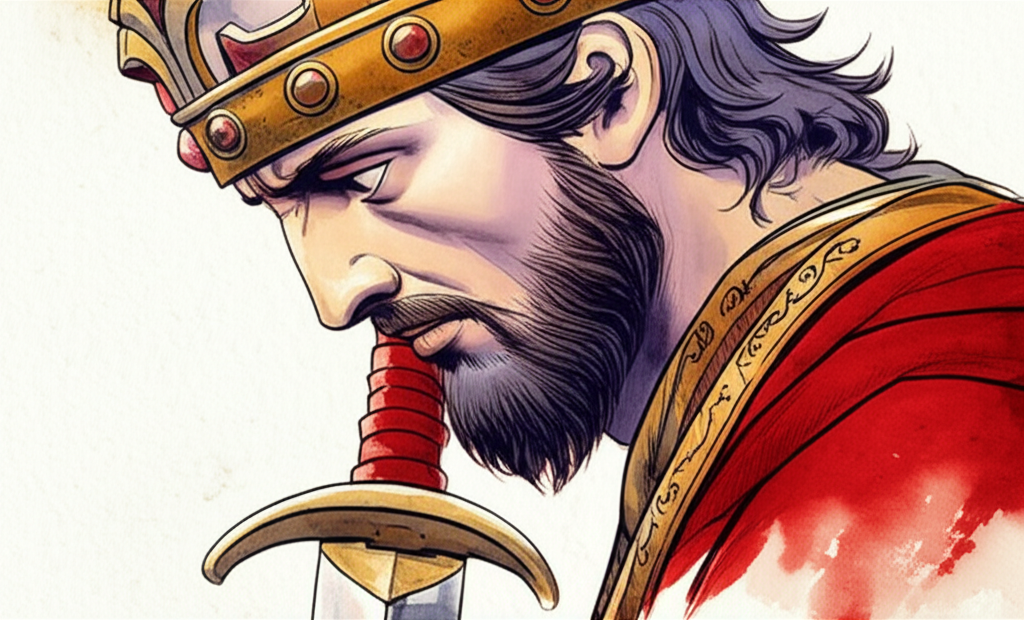


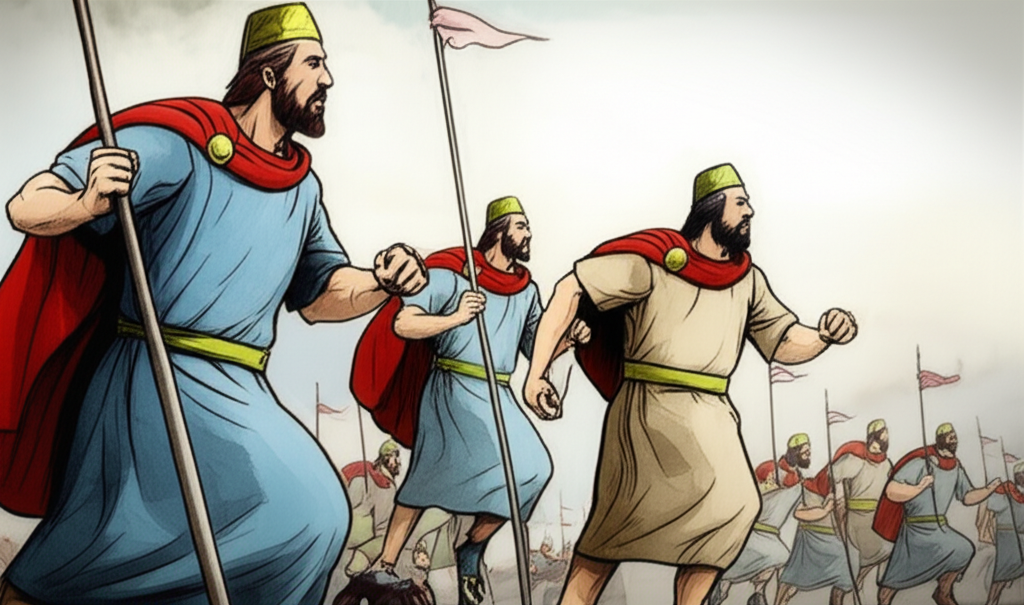
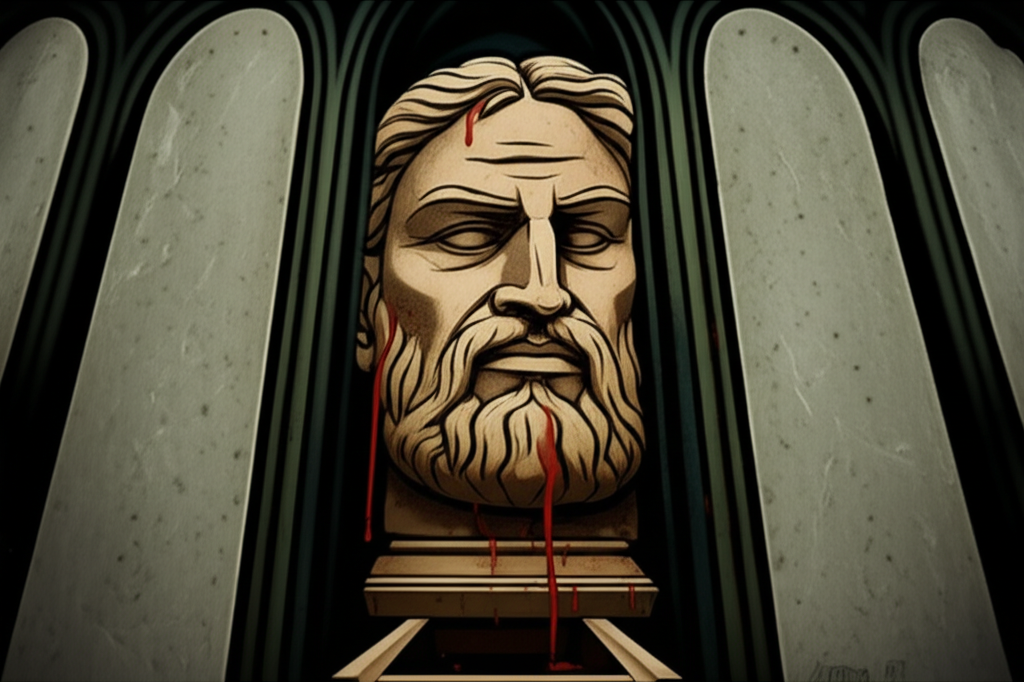
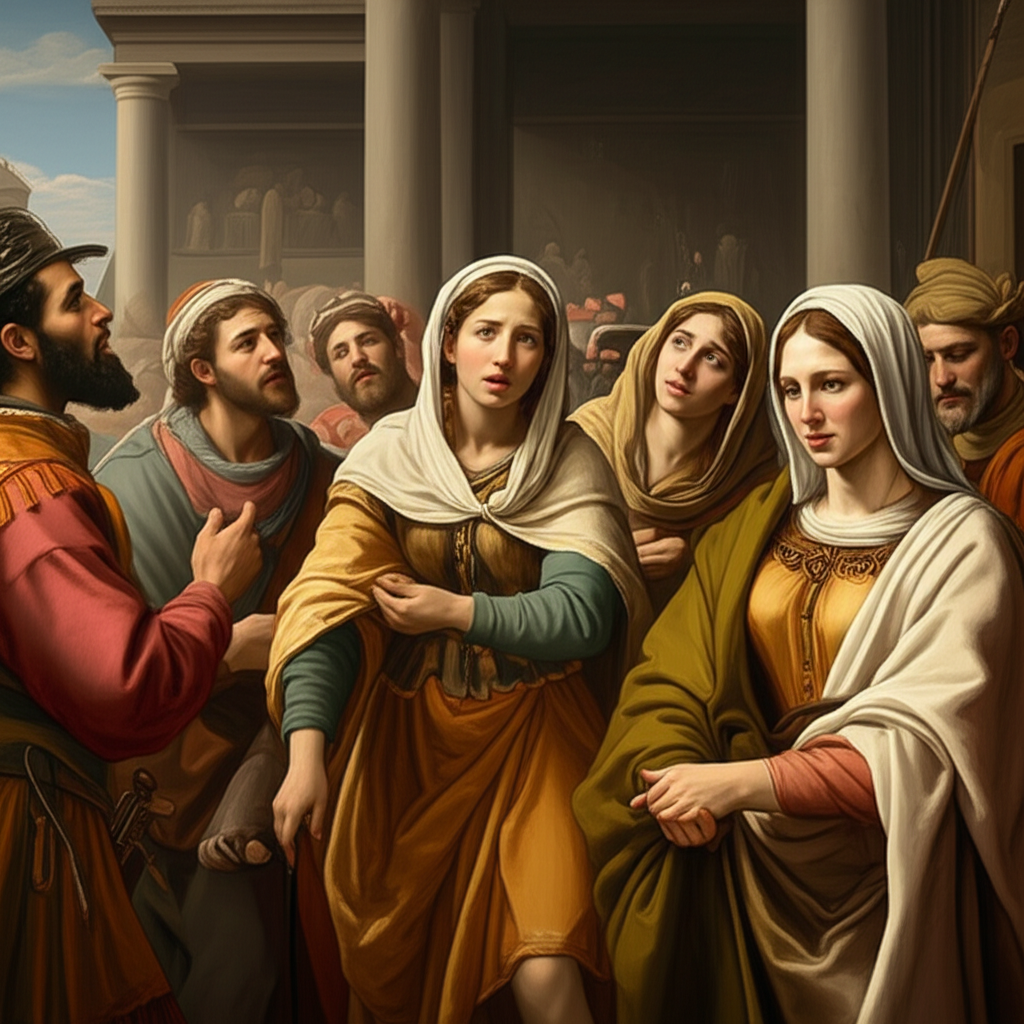
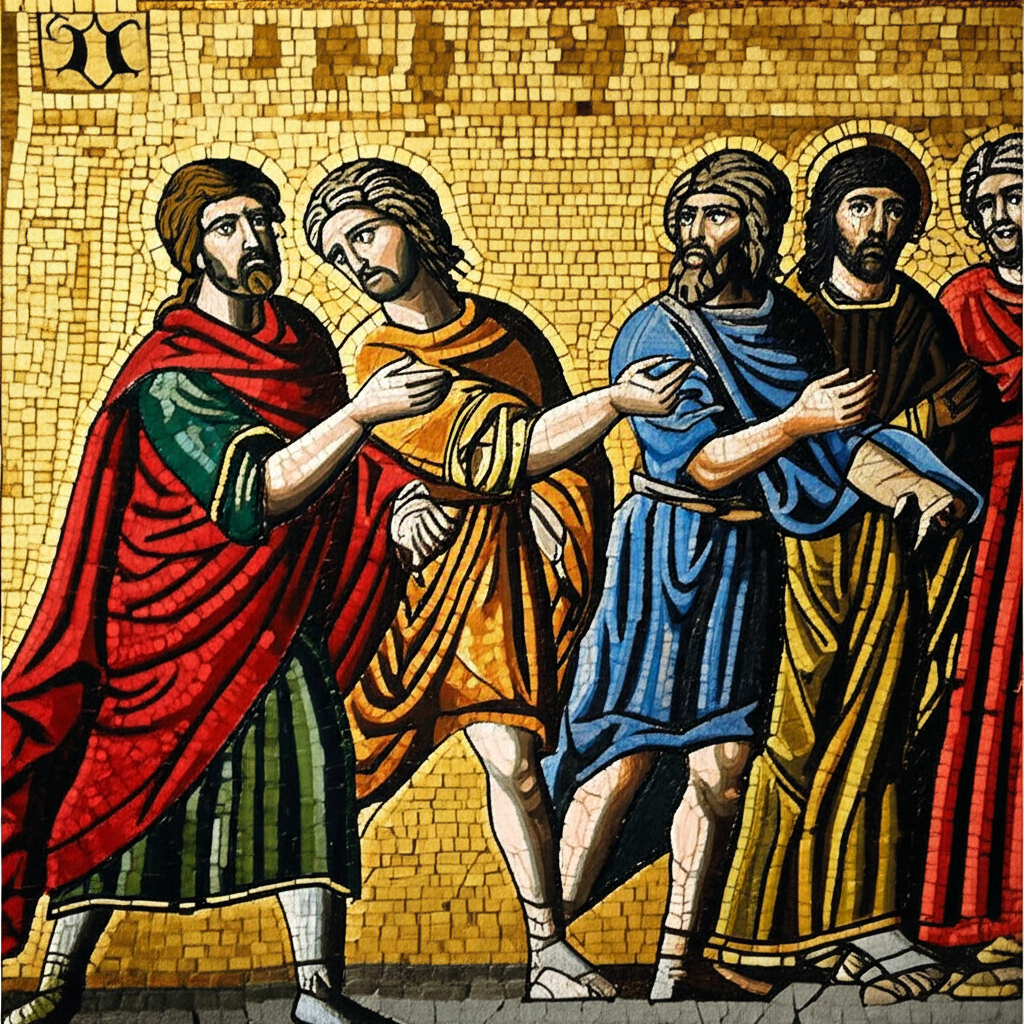

1 Chronicles chapter 10 kjv
- 1 Now the Philistines fought against Israel; and the men of Israel fled from before the Philistines, and fell down slain in mount Gilboa.
- 2 And the Philistines followed hard after Saul, and after his sons; and the Philistines slew Jonathan, and Abinadab, and Malchishua, the sons of Saul.
- 3 And the battle went sore against Saul, and the archers hit him, and he was wounded of the archers.
- 4 Then said Saul to his armourbearer, Draw thy sword, and thrust me through therewith; lest these uncircumcised come and abuse me. But his armourbearer would not; for he was sore afraid. So Saul took a sword, and fell upon it.
- 5 And when his armourbearer saw that Saul was dead, he fell likewise on the sword, and died.
- 6 So Saul died, and his three sons, and all his house died together.
- 7 And when all the men of Israel that were in the valley saw that they fled, and that Saul and his sons were dead, then they forsook their cities, and fled: and the Philistines came and dwelt in them.
- 8 And it came to pass on the morrow, when the Philistines came to strip the slain, that they found Saul and his sons fallen in mount Gilboa.
- 9 And when they had stripped him, they took his head, and his armor, and sent into the land of the Philistines round about, to carry tidings unto their idols, and to the people.
- 10 And they put his armor in the house of their gods, and fastened his head in the temple of Dagon.
- 11 And when all Jabeshgilead heard all that the Philistines had done to Saul,
- 12 They arose, all the valiant men, and took away the body of Saul, and the bodies of his sons, and brought them to Jabesh, and buried their bones under the oak in Jabesh, and fasted seven days.
- 13 So Saul died for his transgression which he committed against the LORD, even against the word of the LORD, which he kept not, and also for asking counsel of one that had a familiar spirit, to enquire of it;
- 14 And inquired not of the LORD: therefore he slew him, and turned the kingdom unto David the son of Jesse.
1 Chronicles chapter 10 nkjv
- 1 Now the Philistines fought against Israel; and the men of Israel fled from before the Philistines, and fell slain on Mount Gilboa.
- 2 Then the Philistines followed hard after Saul and his sons. And the Philistines killed Jonathan, Abinadab, and Malchishua, Saul's sons.
- 3 The battle became fierce against Saul. The archers hit him, and he was wounded by the archers.
- 4 Then Saul said to his armorbearer, "Draw your sword, and thrust me through with it, lest these uncircumcised men come and abuse me." But his armorbearer would not, for he was greatly afraid. Therefore Saul took a sword and fell on it.
- 5 And when his armorbearer saw that Saul was dead, he also fell on his sword and died.
- 6 So Saul and his three sons died, and all his house died together.
- 7 And when all the men of Israel who were in the valley saw that they had fled and that Saul and his sons were dead, they forsook their cities and fled; then the Philistines came and dwelt in them.
- 8 So it happened the next day, when the Philistines came to strip the slain, that they found Saul and his sons fallen on Mount Gilboa.
- 9 And they stripped him and took his head and his armor, and sent word throughout the land of the Philistines to proclaim the news in the temple of their idols and among the people.
- 10 Then they put his armor in the temple of their gods, and fastened his head in the temple of Dagon.
- 11 And when all Jabesh Gilead heard all that the Philistines had done to Saul,
- 12 all the valiant men arose and took the body of Saul and the bodies of his sons; and they brought them to Jabesh, and buried their bones under the tamarisk tree at Jabesh, and fasted seven days.
- 13 So Saul died for his unfaithfulness which he had committed against the LORD, because he did not keep the word of the LORD, and also because he consulted a medium for guidance.
- 14 But he did not inquire of the LORD; therefore He killed him, and turned the kingdom over to David the son of Jesse.
1 Chronicles chapter 10 niv
- 1 Now the Philistines fought against Israel; the Israelites fled before them, and many fell dead on Mount Gilboa.
- 2 The Philistines were in hot pursuit of Saul and his sons, and they killed his sons Jonathan, Abinadab and Malki-Shua.
- 3 The fighting grew fierce around Saul, and when the archers overtook him, they wounded him.
- 4 Saul said to his armor-bearer, "Draw your sword and run me through, or these uncircumcised fellows will come and abuse me." But his armor-bearer was terrified and would not do it; so Saul took his own sword and fell on it.
- 5 When the armor-bearer saw that Saul was dead, he too fell on his sword and died.
- 6 So Saul and his three sons died, and all his house died together.
- 7 When all the Israelites in the valley saw that the army had fled and that Saul and his sons had died, they abandoned their towns and fled. And the Philistines came and occupied them.
- 8 The next day, when the Philistines came to strip the dead, they found Saul and his sons fallen on Mount Gilboa.
- 9 They stripped him and took his head and his armor, and sent messengers throughout the land of the Philistines to proclaim the news among their idols and their people.
- 10 They put his armor in the temple of their gods and hung up his head in the temple of Dagon.
- 11 When all the inhabitants of Jabesh Gilead heard what the Philistines had done to Saul,
- 12 all their valiant men went and took the bodies of Saul and his sons and brought them to Jabesh. Then they buried their bones under the great tree in Jabesh, and they fasted seven days.
- 13 Saul died because he was unfaithful to the LORD; he did not keep the word of the LORD and even consulted a medium for guidance,
- 14 and did not inquire of the LORD. So the LORD put him to death and turned the kingdom over to David son of Jesse.
1 Chronicles chapter 10 esv
- 1 Now the Philistines fought against Israel, and the men of Israel fled before the Philistines and fell slain on Mount Gilboa.
- 2 And the Philistines overtook Saul and his sons, and the Philistines struck down Jonathan and Abinadab and Malchi-shua, the sons of Saul.
- 3 The battle pressed hard against Saul, and the archers found him, and he was wounded by the archers.
- 4 Then Saul said to his armor-bearer, "Draw your sword and thrust me through with it, lest these uncircumcised come and mistreat me." But his armor-bearer would not, for he feared greatly. Therefore Saul took his own sword and fell upon it.
- 5 And when his armor-bearer saw that Saul was dead, he also fell upon his sword and died.
- 6 Thus Saul died; he and his three sons and all his house died together.
- 7 And when all the men of Israel who were in the valley saw that the army had fled and that Saul and his sons were dead, they abandoned their cities and fled, and the Philistines came and lived in them.
- 8 The next day, when the Philistines came to strip the slain, they found Saul and his sons fallen on Mount Gilboa.
- 9 And they stripped him and took his head and his armor, and sent messengers throughout the land of the Philistines to carry the good news to their idols and to the people.
- 10 And they put his armor in the temple of their gods and fastened his head in the temple of Dagon.
- 11 But when all Jabesh-gilead heard all that the Philistines had done to Saul,
- 12 all the valiant men arose and took away the body of Saul and the bodies of his sons, and brought them to Jabesh. And they buried their bones under the oak in Jabesh and fasted seven days.
- 13 So Saul died for his breach of faith. He broke faith with the LORD in that he did not keep the command of the LORD, and also consulted a medium, seeking guidance.
- 14 He did not seek guidance from the LORD. Therefore the LORD put him to death and turned the kingdom over to David the son of Jesse.
1 Chronicles chapter 10 nlt
- 1 Now the Philistines attacked Israel, and the men of Israel fled before them. Many were slaughtered on the slopes of Mount Gilboa.
- 2 The Philistines closed in on Saul and his sons, and they killed three of his sons ? Jonathan, Abinadab, and Malkishua.
- 3 The fighting grew very fierce around Saul, and the Philistine archers caught up with him and wounded him.
- 4 Saul groaned to his armor bearer, "Take your sword and kill me before these pagan Philistines come to taunt and torture me." But his armor bearer was afraid and would not do it. So Saul took his own sword and fell on it.
- 5 When his armor bearer realized that Saul was dead, he fell on his own sword and died.
- 6 So Saul and his three sons died there together, bringing his dynasty to an end.
- 7 When all the Israelites in the Jezreel Valley saw that their army had fled and that Saul and his sons were dead, they abandoned their towns and fled. So the Philistines moved in and occupied their towns.
- 8 The next day, when the Philistines went out to strip the dead, they found the bodies of Saul and his sons on Mount Gilboa.
- 9 So they stripped off Saul's armor and cut off his head. Then they proclaimed the good news of Saul's death before their idols and to the people throughout the land of Philistia.
- 10 They placed his armor in the temple of their gods, and they fastened his head to the temple of Dagon.
- 11 But when everyone in Jabesh-gilead heard about everything the Philistines had done to Saul,
- 12 all their mighty warriors brought the bodies of Saul and his sons back to Jabesh. Then they buried their bones beneath the great tree at Jabesh, and they fasted for seven days.
- 13 So Saul died because he was unfaithful to the LORD. He failed to obey the LORD's command, and he even consulted a medium
- 14 instead of asking the LORD for guidance. So the LORD killed him and turned the kingdom over to David son of Jesse.
- Bible Book of 1 Chronicles
- 1 Adam to Noah and Abraham
- 2 Lineage of King David Tribe of Judah
- 3 King David Children
- 4 Descendants of Judah
- 5 Descendants of Reuben
- 6 Sons of Levi The Priestly Line
- 7 Descendants of Issachar
- 8 A Genealogy of Saul
- 9 A Genealogy of the Returned Exiles
- 10 The Death of King Saul
- 11 David Anointed King
- 12 The Mighty Men Join David
- 13 The Ark Brought from Kiriath-Jearim
- 14 David's Wives and Children
- 15 The Ark Brought to Jerusalem
- 16 The Ark Placed in a Tent
- 17 The Lord's Covenant with David
- 18 David Defeats His Enemies
- 19 The Ammonites Disgrace David's Men
- 20 The Capture of Rabbah
- 21 David's Census Brings Pestilence
- 22 David Prepares for Temple Building
- 23 David Organizes the Levites
- 24 24 Courses of Priests
- 25 David Organizes the Musicians
- 26 Divisions of the Gatekeepers
- 27 Military Divisions
- 28 David's Charge to Israel
- 29 Offerings for the Temple